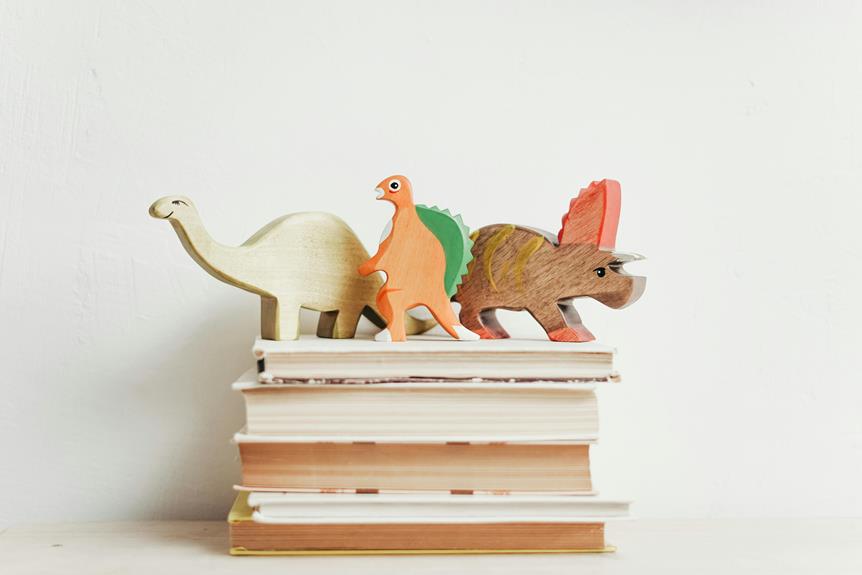
Blog
How Can I Choose Age-Appropriate Toys That Stimulate Learning?

When choosing toys that stimulate learning, match them to your child's age and stage of development. Select toys that foster physical, cognitive, and emotional growth, preventing frustration and enhancing learning. Toys like puzzles, memory games, and building sets boost problem-solving skills and curiosity. Encourage creativity with items like building blocks and play-dough. Remember, age-appropriateness is key for engagement and safety, so always check labels and observe your child's play habits. For more insights on selecting the best toys for your child's development, discover further details within the research provided.
Understanding Child Development Stages
Understanding Child Development Stages involves observing and recognizing key milestones in a child's growth and learning journey. It's crucial to comprehend the typical developmental stages that children go through to provide appropriate support and stimulation. By understanding these stages, you can tailor activities and interactions to best suit the child's current needs and abilities.
During infancy, babies develop crucial skills such as grasping objects, making eye contact, and responding to sounds. As they progress into the toddler stage, they start exploring their surroundings, developing language skills, and refining their motor abilities. Preschoolers enter a stage where they're eager to learn, ask many questions, and engage in imaginative play.
Importance of Age-Appropriate Toys
When selecting toys for children, it's vital to consider their age appropriateness to ensure they align with the child's developmental stage. Age-appropriate toys play a crucial role in fostering a child's physical, cognitive, and emotional development. These toys are specifically designed to match a child's abilities and interests at different stages of growth, helping them learn new skills while having fun.
Toys that are too advanced may frustrate a child, leading to disinterest or a sense of failure. Conversely, toys that are too simplistic mightn't challenge a child enough, hindering their learning potential. By choosing toys that are suitable for a child's age, you provide them with opportunities to explore, problem-solve, and enhance their creativity in ways that are both engaging and beneficial.
Moreover, age-appropriate toys can also promote safety by ensuring that they don't pose any hazards to a child based on their stage of development. Always remember to check the recommended age range on toy labels to make informed decisions when selecting toys for the young ones in your life.
Toys for Cognitive Development
To enhance cognitive skills in children, select toys that stimulate problem-solving abilities and critical thinking. Look for puzzles that challenge your child's ability to think logically and strategically. Building blocks and shape-sorting toys can also encourage cognitive development by enhancing spatial awareness and reasoning skills. Memory games and matching activities are great for improving concentration and cognitive processing.
Interactive toys like electronic learning tablets can provide engaging activities that promote cognitive growth. These toys often incorporate educational games that require children to solve problems and think critically to advance. Board games that involve planning, decision-making, and reasoning are excellent for developing cognitive skills in a fun and social setting.
Toys that involve experimentation, such as science kits or building sets, can foster curiosity and a love for learning in children. Encouraging hands-on exploration and discovery through play can greatly benefit cognitive development. Remember to choose toys that are age-appropriate and align with your child's interests to maximize the cognitive benefits they provide.
Encouraging Creativity Through Play
Explore toys that spark imagination and creativity by encouraging open-ended play experiences. Look for toys like building blocks, art supplies, dress-up clothes, and pretend play sets. These types of toys allow children to use their imagination freely, creating unique scenarios and exploring different roles.
Building blocks, for example, can be transformed into various structures, promoting problem-solving skills and spatial awareness.
Encouraging creativity through play also involves providing opportunities for children to engage in sensory experiences. Play-dough, water tables, and sensory bins filled with different textures can stimulate creativity and sensory exploration. Children can mold, squish, and mix materials to create their own sensory masterpieces.
Additionally, consider toys that promote storytelling and narrative play. Dollhouses, action figures, and puppets can inspire children to come up with elaborate storylines, enhancing language development and creativity. Encourage children to act out scenes, create dialogue, and invent new adventures with these toys to foster their imaginative skills.
Making Informed Toy Choices
Consider carefully the age appropriateness of toys when making informed choices for your child's playtime. Choosing toys that align with your child's developmental stage is crucial for promoting learning and engagement. Before purchasing a toy, take a moment to read the age recommendations provided on the packaging. These guidelines are designed to help you select toys that are safe and beneficial for your child's cognitive and physical development.
Look for toys that cater to your child's interests and abilities. Toys that are too advanced may lead to frustration, while those that are too simplistic may not hold their attention. By observing your child's play habits and preferences, you can better understand what types of toys will stimulate their learning effectively.
Additionally, consider the durability and safety of the toys you choose. Opt for toys made from high-quality materials that can withstand rough play. Ensure that the toys don't have small parts that could pose a choking hazard to young children. By making thoughtful and informed toy choices, you can provide your child with enriching play experiences that support their growth and development.
